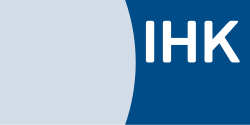Association of German Chambers of Industry and Commerce
 |
|
| Founded | about 1872 |
|---|---|
| Type | Advocacy group |
| Focus | Business advocacy |
| Location | |
|
Area served
|
|
| Method | trade promotion Political lobbying |
|
Key people
|
Prof. Dr. Hans Heinrich Driftmann, President of DIHK Dr. Martin Wansleben, Chief Executive of the DIHK |
| Website |
DIHK AHK USA |
Association of German Chambers of Industry and Commerce (German: Deutscher Industrie- und Handelskammertag, DIHK). The DIHK is a German 'chamber,' similar to an English guild but is required under German law and provides political influence of a trade union. This organization was formerly known as the Deutscher Industrie- und Handelstag or DIHT.
In Germany, 'Chambers of Commerce and Industry' is an organization for 80 'chambers' who represents companies within the German state. The DIHK provides over 'three million entrepreneurs' or association members, representing small kiosks and shops to larger commercial companies, with political influence. DIHK has its headquarters in Berlin, a major office in Brussels and representative offices throughout Europe.
Association members are under German Chamber of Commerce compulsory or public law model, enterprises of certain sizes, types, or sectors are obliged to become members of the chamber. This model is common in European Union countries (France,Germany, Italy, Spain), but also in Japan. Main tasks of the chambers are foreign trade promotion, vocational training, regional economic development, and general services to their members. The chambers were given responsibilities of public administration in various fields by the state which they exercise in order management. The chambers also have a consultative function; this means the chambers must be consulted whenever a new law related to industry or commerce is proposed.
In Germany, for over 150 years, the chambers of commerce and industry (IHK - Industrie- und Handelskammer) and the chambers of skilled crafts (HwK - Handwerkskammer) are public statutory bodies with self-administration under the inspectorate of the state ministry of economy. Enterprises are members by law according to the chamber act (IHK-Gesetz) of 1956. Because of this, such chambers are much bigger than chambers under private law. IHK Munich, the biggest German chamber of commerce, has 350,000 member companies. Germany also has compulsory chambers for "free occupations" such as architects, dentists, engineers, lawyers, notaries, physicians and pharmacists. Exceptions are skilled craftsmen, freelancers and agricultural businesses.
...
Wikipedia
